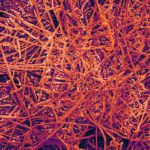Lien vers Pubmed [PMID] – 31851924
Cell Rep 2019 Dec;29(12):3933-3945.e3
Natural killer (NK) cells are unique players in innate immunity and, as such, an attractive target for immunotherapy. NK cells display immune memory properties in certain models, but the long-term status of NK cells following systemic inflammation is unknown. Here we show that following LPS-induced endotoxemia in mice, NK cells acquire cell-intrinsic memory-like properties, showing increased production of IFNγ upon specific secondary stimulation. The NK cell memory response is detectable for at least 9 weeks and contributes to protection from E. coli infection upon adoptive transfer. Importantly, we reveal a mechanism essential for NK cell memory, whereby an H3K4me1-marked latent enhancer is uncovered at the ifng locus. Chemical inhibition of histone methyltransferase activity erases the enhancer and abolishes NK cell memory. Thus, NK cell memory develops after endotoxemia in a histone methylation-dependent manner, ensuring a heightened response to secondary stimulation.



